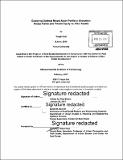| dc.contributor.advisor | David M. Geltner. | en_US |
| dc.contributor.author | Sul, Yoojin | en_US |
| dc.contributor.other | Massachusetts Institute of Technology. Center for Real Estate. Program in Real Estate Development. | en_US |
| dc.date.accessioned | 2017-05-11T19:54:19Z | |
| dc.date.available | 2017-05-11T19:54:19Z | |
| dc.date.copyright | 2017 | en_US |
| dc.date.issued | 2017 | en_US |
| dc.identifier.uri | http://hdl.handle.net/1721.1/108894 | |
| dc.description | Thesis: S.M. in Real Estate Development, Massachusetts Institute of Technology, Program in Real Estate Development in conjunction with the Center for Real Estate, 2017. | en_US |
| dc.description | Cataloged from PDF version of thesis. | en_US |
| dc.description | Includes bibliographical references (pages 84-85). | en_US |
| dc.description.abstract | The current world economy confronts investors with many challenges, especially investors managing institutional portfolios. Global GDP growth has been slowed, and the performance of traditional assets - equities and bonds - alone are often not able to satisfy the various risk and return objectives that institutional investors seek in their portfolios. Amid this challenging investment environment, investors around the world are seeking new investment strategies to lessen their reliance on those traditional asset classes. Consequently, alternative investments continue to garner greater attention of investors as an effective method to diversify their portfolios and to potentially increase overall returns and mitigate risk. However, the term "alternative investments" encompasses a broad range of investment concepts and there is no generally accepted standard definition. A major focus of this thesis is to compare real estate and real assets with hedge funds and private equity, the four most prevalent sub-classes within alternative investments. Specifically, we address the question of whether, or to what extent, real assets including real estate can improve the performance of institutional investment portfolio, in particular in comparison with the private equity and hedge funds. Additionally, we analyze the effect of diversifying globally compared to domestically. We first develop a common ground regarding alternative investments and their characteristics. Then, we focus primarily on traditional mean-variance optimization but also consider risk parity as the allocation criterion to explore the optimal mixed-asset allocation strategies as a function of the investor's expected return target. Additionally, we compare the resulting allocations with institutional investors current average allocation in their portfolios. The findings clearly indicate that adding alternative asset classes generally offers attractive diversification opportunities to a portfolio consisting of only traditional asset classes - stocks and bonds. We find that real assets and the private equity & hedge fund type of alternative assets both enhance the portfolio, and the aggregated optimal share of these alternative investments is much higher than current industry practice. However, the role of the various different types of alternative investments varies widely in a portfolio, in particular as a function of the investor's risk/return appetite. | en_US |
| dc.description.statementofresponsibility | by Yoojin Sul. | en_US |
| dc.format.extent | 92 pages | en_US |
| dc.language.iso | eng | en_US |
| dc.publisher | Massachusetts Institute of Technology | en_US |
| dc.rights | MIT theses are protected by copyright. They may be viewed, downloaded, or printed from this source but further reproduction or distribution in any format is prohibited without written permission. | en_US |
| dc.rights.uri | http://dspace.mit.edu/handle/1721.1/7582 | en_US |
| dc.subject | Center for Real Estate. Program in Real Estate Development. | en_US |
| dc.title | Exploring optimal mixed-asset portfolio allocation : hedge funds and private equity vs. real assets | en_US |
| dc.title.alternative | Hedge funds and private equity versus real assets | en_US |
| dc.type | Thesis | en_US |
| dc.description.degree | S.M. in Real Estate Development | en_US |
| dc.contributor.department | Massachusetts Institute of Technology. Center for Real Estate. Program in Real Estate Development. | en_US |
| dc.contributor.department | Massachusetts Institute of Technology. Center for Real Estate | |
| dc.identifier.oclc | 986240632 | en_US |
